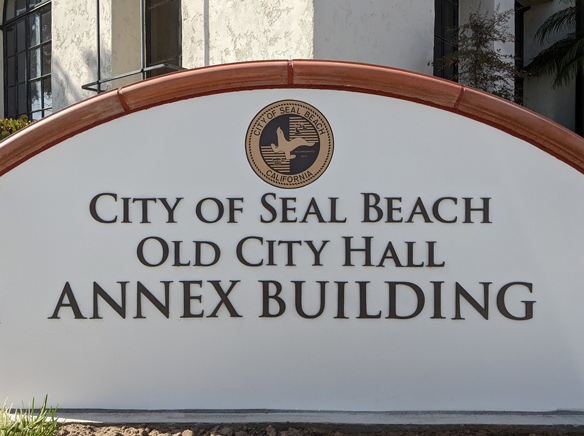Part one of two.
The Seal Beach City Council began the water and sewer rate hearings on Monday, Feb. 12. They will continue on Feb. 26. This was the last item on the agenda. At the start of the approximately four-hour, six-minute meeting, District Four Council Member/Mayor Schelly Sustarsic announced that anyone who has a written protest may submit them up until the Feb. 26 meet. The city attorney confirmed that later in the meeting.
If the city received written protests from more than 50% of parcel owners prior to the meeting, the council could not legally raise rates. According to City Attorney Nicholas Ghirelli, the protest procedure was set by state law: Prop. 218.
The numbers were 2,523 for water and 2,347 for sewer, according to a Feb. 1 email from Assistant City Manager Patrick Gallegos.
In all, during the hearing 13 members of the public spoke out against the proposed increases to water and sewer rates. That doesn’t include remarks made during the public comment period at the start of the council meeting. (Due to the length of the meeting and limited space, details will be reported in the second part of this article.)
During the hearing, more than one member of the public objected to the protest process. At least two individuals objected to parcel owners being the only ones to vote as prevented most of the residents of Leisure World, more than a third of the city’s population, from participating. Another individual argued that the requirement should be for more than 50% of the parcel owners to approve a rate increase. Others raised concerns about how salaries were applied to the water and sewer rates. According to staff, money for water and sewer rates may only be spent on water and sewer services.
Motion defeated
District Three Councilwoman Lisa Landau made a motion to send the water and sewer rate study back to staff. The motion was defeated by a 2-3 vote. The dissenting votes were cast by District One Council Member Joe Kalmick, District Five Councilman Nathan Steele, and District Four Council Member/Mayor Schelly Sustarsic. Landau and District Two Council Member Tom Moore voted in favor of the motion.
Background on protest
“Water and sewer rate adjustments are subject to Proposition 218’s public hearing and majority protest procedures. On December 11, 2023, City Council directed the public notification in compliance with Proposition 218, and set a public hearing date of February 12, 2024,” according to the staff report by Public Works Director Iris Lee.
“At the conclusion of the public hearing, the City Clerk will complete the tabulation of all written protests received from record property owners, water customers, and sewer customers, including those received during the public hearing. Only one protest will be accepted per property parcel. The City Clerk will then report on the results to the City Council,” Lee wrote. City Clerk Gloria Harper did not report on the results to the City Council as the public hearing hasn’t ended.
“If the final tabulation of the written protests submitted against the Water Rate adjustments exceeds more than 50% of all the parcels in the City, a majority protest exists, and the City Council shall not impose the Water Rate increase,” Lee wrote.
“If the final tabulation is less than 50% of all the parcels in the City, the City Council would consider implementing the Water Rate increases effective April 1, 2024, and then on January 1 for each year from 2025 through 2028,” Lee wrote.
“If the final tabulation of the written protests submitted against the Sewer Rate adjustments exceed more than 50% of all the parcels in the City, a majority protest exists, and the City Council shall not impose the Sewer Rate increase,” Lee wrote.
“If the final tabulation is less than 50% of all the parcels in the City, the City Council would consider implementing the Sewer Rate increases effective April 1, 2024, and then on January 1 for each year from 2025 through 2028,” Lee wrote.
Background on rates
“Rates are regularly evaluated as part of the City’s annual budgeting process to ensure projected revenues are sufficient to cover all Water and Sewer utility related expenditures. The City’s last rate adjustment was approved in February 2021; however, the rates are no longer sufficient to balance ongoing operating costs,” Lee wrote.
“On June 12, 2023, the City Council unanimously authorized retaining Raftelis Financial Consultants, Inc. (“Raftelis”) to conduct a Water and Sewer Rate Study to ensure the City’s plan for critical infrastructure maintenance and funding for capital improvement projects are in alignment. This would include meeting established reserve policies, continued reinvestment into the aging infrastructure to ensure system reliability, inflationary cost increases, preparation of current and future mandates, and ensure water quality is met,” Lee wrote.
Drinking water system
“Based on Raftelis’ detailed financial plan analysis, the February 2021 rate adjustments are no longer sufficient to balance the operating costs due to: 1. Successful water conservation of 21% during the last major drought along with the Winter 2023 atmospheric rivers that reduced outdoor irrigation use. This resulted in approximately $600,000 in lost revenue; 2. Increased wholesale import and groundwater costs; 3. Aging infrastructure and deferred maintenance; 4. Overall inflationary impacts; and, 5. On-going introduction of new legislation,” Lee wrote.
Sewer sewer system
“The Sewer Rates have been constructed with a financial plan that corrects the structural deficit and sufficiently funds operations, capital and reserves,” Lee wrote. “The required Sewer Utility revenue to properly sustain operations will require market-debt issuance,” Lee wrote. That apparently means issuing a bond.
A table in the staff report showed a market debt of $14 million being issued in 2027.





